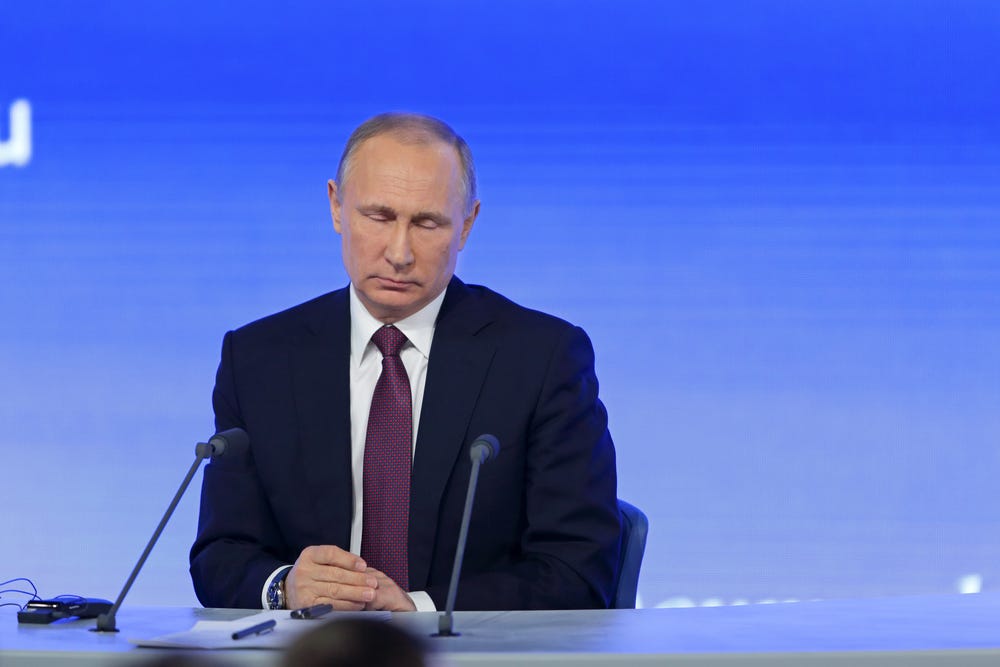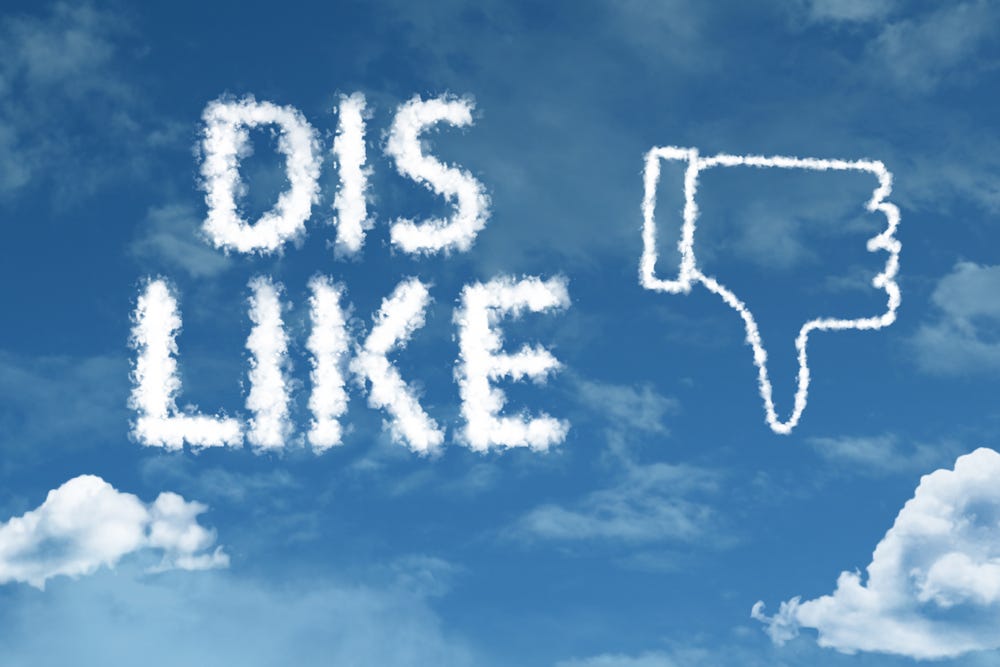E-Pluribus | March 2, 2022
Not everything can be traced to wokeness, a young person's take on free speech, and a career-ending tweet (yes, again.)
A round up of the latest and best writing and musings on the rise of illiberalism in the public discourse:
Cathy Young: Don't Blame "Woke" Excess for Putin's Aggression
In her final piece for Arc Digital before moving over to The Bulwark full time, Cathy Young warns against trying to cram everything into the “woke” box. While cultural issues may exist on the periphery of Putin and Russia’s move against Ukraine, regional and historical issues along with Putin’s delusions of grandeur for a new Russian empire are far more responsible for the aggression than any trendy progressive notions.
I share many of Kisin’s—and Heying’s—criticisms of “wokeness,” including the obsession with gender identities and the performative self-flagellation over the sins of the West. I even agree that “wokeness” is relevant to the question of how to push back against the enemies of freedom: endlessly focusing on identity-based divisions and promoting the notion that liberal democracy is based on a foundation of racism, patriarchy, and other other oppressions is not a good way to rally people to the defense of the Free World.
But several caveats are in order.
First, I think the Kisin/Heying type of argument drastically exaggerates the reach of “wokeness,” or radical social-justice leftism. Yes, it has far too much influence in key cultural institutions in the United States and in many European countries, and it does pose a real threat to liberal society and its key values such as tolerance, pluralism, and individual rights. But more traditional liberalism (and centrism, and moderate conservatism) are far from extinct.
[ . . . ]
Fourth and last: If toxic, illiberal, and polarizing trends on the left endanger social cohesion in liberal societies and embolden the foreign autocrats who are watching, surely this is also true of toxic, illiberal, and polarizing trends on the right: anti-immigrant hysteria, populist grievance and anti-“elite” class warfare, apologetics for racism and misogyny under the guise of combating “political correctness.”
I know there’s a view on the right that Trump would have deterred Putin from invading Ukraine, if only by being unpredictable; but surely Trump’s trashing of American alliances, his in-your-face rejection of any moral foundation for American policy (remember his dismissal of Putin’s killing of journalists and political opponents with, “You think we don’t kill people?”) and his coziness with authoritarians are as likely as “wokeness” to have emboldened enemies abroad.
If the Free World’s will to stand up for freedom is sapped by rhetoric that treats the legacy of liberalism and the Enlightenment as a façade for white supremacy, then surely it is also sapped by rhetoric that treats modern liberal democracy as a fig leaf for rule by sinister globalist elites and mask mandates as the equivalent of the Gulag. Surely, conspiracy theories about pedophile cabals, stolen elections, the “plandemic” intended to bring the world’s economies to their knees, and the diabolical plan behind vaccination should also count as part of the problem.
Read it all.
Sabrina Morera: FIRE’s 2021 Free Speech Essay Contest, First Place
The Foundation for Individual Rights in Education recently held a high school Free Speech essay contest. The winner, high school senior Sabrina Morera at the Doral Performing Arts and Entertainment Academy in Florida, wrote of her family’s experience in Cuba and how that shaped her own perceptions of the importance of the First Amendment and why her generation must fight today’s illiberal trends to keep the same opportunities available to future students regardless of where they come from.
My parents brought me to this country at a young age for one thing: freedom. They brought me so that, unlike my mother, I would attend college regardless of my family’s political opinion. So that, unlike my great uncle, I would not be incarcerated and tortured for not supporting the government. So that unlike my uncle, I would not be threatened if I ever tried to leave the country. So that unlike every Cuban, I would not be indoctrinated and censored throughout my education. Today, free speech is in danger in universities throughout the United States — posing democracy at risk.
[ . . . ]
Censorship creates a uniformity with which this country was not founded. Historically, the two-party system in the United States has maintained democracy and prevented one-sidedness. However, if students are taught that they must all think the same and are not allowed to hear opposing opinions, this balance will be tipped — taking away the essence of the United States.
[ . . . ]
Taking away freedom at lower levels, such as schools, can serve as a catalyst to the elimination of liberty on a larger scale. This would follow the patterns of the Soviet Union, Nazi Germany, Revolutionary Cuba, and many other dictatorships which have not allowed the youth to truly learn and be exposed to ideas different than the ones that have been imposed upon them. One should be able to express any belief without any sort of fear, as this is the reason that many have left their home countries or rebelled against their government. Lack of freedom, historically, has led to rebellion — one can see this with monarchies and authoritarian governments. Therefore, taking away freedom in colleges can lead to manifestations of rebellion, or can opposingly lead to fear — both of which can be avoided by respecting students’ Constitutional rights.
Read it all here.
John McWhorter: One Graceless Tweet Doesn’t Warrant Cancellation
Yesterday’s E-Pluribus included (item #1) an essay on the current Age of Apology and how those apologies seem to fall upon deaf ears. Also at The New York Times, John McWhorter relates one such disturbing story of a Columbia University professor forced out of several positions based on outrage over a seriously misunderstood compliment despite the context and an abject apology from the professor.
Dr. Jeffrey Lieberman, a professor of psychiatry at Columbia University and one of the most accomplished and respected psychiatrists in the world, recently tweeted about Nyakim Gatwech, the celebrated American model of South Sudanese descent who is known for her dark skin, writing, “Whether a work of art or freak of nature she’s a beautiful sight to behold.” A number of people on social media and within and outside Lieberman’s profession found his words offensive, particularly his use of the phrase “freak of nature” and specifically the term “freak” in a tweet about a Black woman, and the sequence of events that followed was, sadly, all too predictable.
As the Times’s Lola Fadulu reported Wednesday, Lieberman has resigned from his position as executive director of the New York State Psychiatric Institute, was suspended by the university and will no longer serve as psychiatrist in chief at NewYork-Presbyterian/Columbia University Irving Medical Center.
The day before he was suspended, Lieberman apologized in an email to colleagues, saying, according to The City, that he had tweeted “a message that was racist and sexist” and contained “prejudices and stereotypical assumptions I didn’t know I held” and that he was “deeply ashamed and very sorry.” He offered that “an apology from me to the Black community, to women, and to all of you is not enough. I’ve hurt many, and I am beginning to understand the work ahead to make needed personal changes and over time to regain your trust.” Note, here, his understanding that the apology by itself was not the whole job, that he has learned much from our current culture and was trying to do the right thing.
[ . . . ]
It would obviously be fair to say that Lieberman’s tweet reflected poor judgment, particularly for someone in his position. There’s no good reason for a senior university official to randomly and publicly remark on a model’s looks, however complimentary he thought he was being. But a compliment it was. He didn’t call Gatwech a “freak,” and to argue that he intended to requires a rather laborious reading of that tweet.
[ . . . ]
For someone to instead, almost instantly, be suspended from one job, dismissed from another and resign from a third because of such a thing is a disproportion of punishment to crime. It is extreme and unnecessary and ultimately lacks reason. There’s something amiss if we’re now at the point that someone’s career is to be permanently tarnished and perhaps ended based on a passing error, which started as a misguided attempt at praise and which has been profusely apologized for. We must assess what the actual purpose of this kind of language policing is. We must ask: What, in terms of combating racism, is accomplished? Will it result in better and more available psychiatric care — or medical care in general — for Black people? Will it make Columbia University, where I am a faculty member, a more open-minded place?
Read the whole thing.
Around Twitter
Via Heterodox Academy, findings regarding student attitudes about classroom discussion:
In related news, via Paul Graham, self-censorship is a major problem in academia today:
Via Colin Wright - are stereotypes good again?
Finally, the Foundation for Individual Rights in Education with a stark reminder of the importance of the First Amendment:












